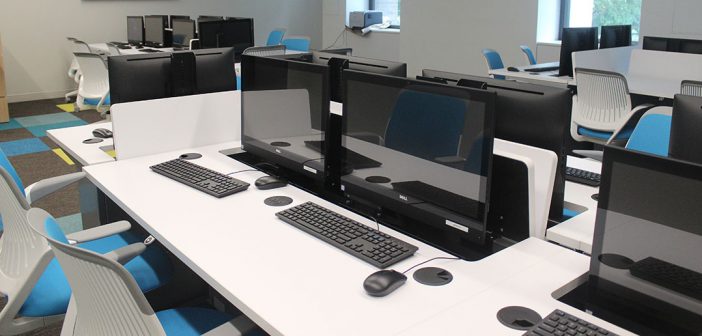In spite of shrinking government funding for higher education, Fordham’s office of Government Relations and Urban Affairs has successfully secured $2.5 million in state and municipal capital grant funding from the New York State legislature for the renovation of University’s computer science laboratories in John Mulcahy Hall.
The grant, which is administered by the Dormitory Authority of the State of New York, was the result of bi-partisan support of the State’s assembly and senate. Lesley A. Massiah-Arthur, associate vice president of government relations and urban affairs at Fordham, explained that the University secured the support of legislative leadership, including former New York senators Jeffrey Klein and Martin Golden, as well as the Assembly’s Bronx delegation, which is led by Assemblyman Jeffrey Dinowitz.
After Klein and Golden were defeated in elections in 2018, Government Relations worked with the staffs of New York State Assembly Speaker Carl Heastie, former State Senate Majority Leader John Flanagan, current State Senate Majority Leader Andrea Stewart-Cousins and Governor Andrew Cuomo to move the project through the legislative and agency processes toward completion.
Massiah-Arthur said the grant, which will reimburse Fordham for recently completed work to refurbish facilities on the Rose Hill campus, is proof that New York lawmakers see Fordham as a an institution that serves the public at large.
“While this project represents Fordham’s vision to provide its students and faculty with the resources they need for cutting-edge scientific discovery,” she said, “ultimately, the pursuit of this grant is representative of the University’s commitment to creating a vibrant science community at Fordham and within the region,” she said.
The University has worked in tandem with government before, securing public funds for the construction of new residence halls at Rose Hill, as well as its regional parking facility.
Massiah-Arthur said that when it comes to the sciences, Fordham can point to programs such as STEP (Science and Technology Entry Program for Students in Grades 7 to 12) and CSTEP (Collegiate Science and Technology Entry Program) as examples of the University reaching beyond the campus. STEP is an enrichment program for underrepresented minority and economically disadvantaged students in junior high and high school, while CSTEP is a statewide undergraduate scholars program designed to prepare minority and economically disadvantaged students for careers in the STEM, health and law fields. Government Relations also secured the support of its legislative delegations to successfully restore the proposed budget cuts to these programs.
The renovation of the third floor of John Mulcahy Hall was motivated by a dramatic growth in the STEM field at Fordham. Over the past decade, undergraduate enrollment in STEM has more than doubled, and graduate enrollment in STEM has septupled.
“At the end of the day, this shows not only that private colleges and universities contribute to the public good, but that we’ve worked hard at building our relationship with our legislators, staff, and the agencies,” Massiah-Arthur said.



